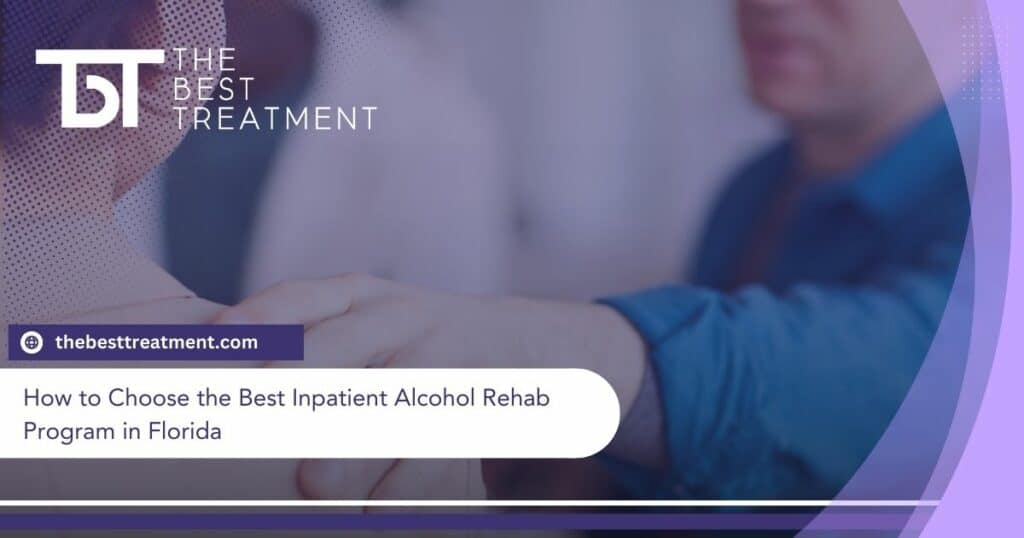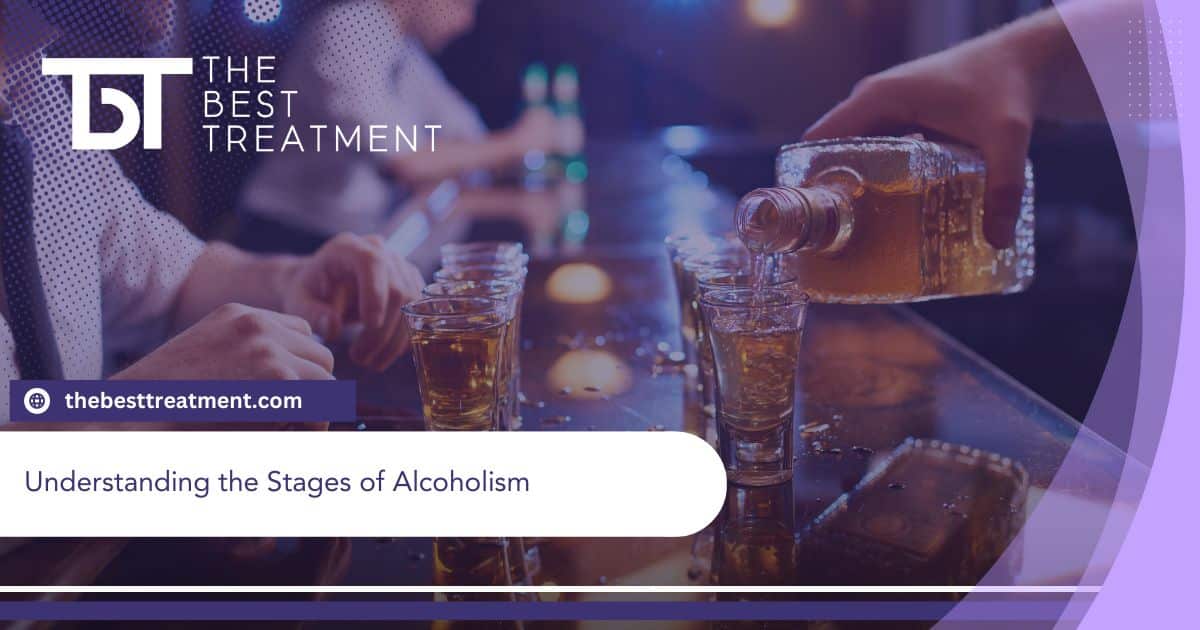Table of Contents
According to the National Institute of Alcohol Abuse and Alcoholism (NIAAA), 29.5 million people met the criteria for alcoholism in 2021.[1]
Alcoholism is a chronic and progressive disease that can wreak havoc on every area of your life. As a progressive condition, it starts subtly and becomes severe over time. What begins as occasional heavy drinking can lead to end-stage alcoholism, resulting in severe medical complications like liver disease or alcoholic dementia.
The severity of alcoholism can be broken down into four stages. The stages of alcoholism include pre-alcoholic, early alcoholic, middle alcoholic, and end-stage alcoholic. You should always seek help as soon as you come to terms with the fact that you are struggling with an alcohol use disorder, whether you are in the early or late stage.
The Four Stages of Alcoholism
Often, alcoholism begins before you even have the chance to realize it. While you are going out drinking with your friends every weekend with just having fun in mind, you could be in the early stages of an alcohol use disorder.
The four stages of alcoholism and their signs include:
1. Pre-Alcoholic
The pre-alcoholic stage of alcohol use disorder begins before there is even a noticeable problem with alcohol. As a result, it can be difficult to identify as your relationship with alcohol is not quite problematic, and it doesn’t look like the stereotypical alcoholic.
Typically, someone in the pre-alcoholic stage will use alcohol as a tool to unwind after a long workday, use it to improve their social skills when they are out with friends, or help them deal with uncomfortable emotions.
In other words, the pre-alcoholic stage is characterized by using alcohol as a tool to cope with everyday life events. However, you do not have to be drinking daily or even frequently to be in the pre-alcoholic stage.
2. Early-Stage Alcoholism
Early-stage alcoholism is a little bit easier to spot than the pre-alcoholic stage. Instead of only using alcohol occasionally to cope, you will begin binge drinking regularly. You might also experience frequent blackouts from drinking so much at once.
If you are binge drinking regularly, which is having more than four drinks within two hours as a woman or five drinks as a man, it’s time to reconsider your relationship with alcohol.
Of course, people in this stage are still using alcohol to cope with uncomfortable emotions, just at a more intense and frequent rate than people in the pre-alcoholic stage.
3. Middle Alcoholic Phase
During the middle alcoholic stage, your problematic relationship with alcohol will become apparent to your friends and loved ones. However, alcoholism can make it difficult for you to spot the problem in yourself, as denial and avoidance are common themes among individuals in this stage.
People in the middle alcoholic stage will often downplay the amount of alcohol they drink, come up with rationalizations to make themselves feel comfortable with how much alcohol they consume, and even begin to experience consequences at home, school, or work because of their relationship with alcohol.
Common signs of middle-stage alcoholism include:
- Continuing to drink despite facing problems at home, school, or work
- Downplaying or minimizing loved one’s concerns about their drinking
- Drinking in risky situations like at work or while driving
- Feeling guilty or ashamed about your drinking internally but continuing to justify it
- Drinking in large amounts frequently
- Experiencing mood changes because of your drinking
- Having symptoms of withdrawal if you stop drinking
4. End-Stage Alcoholism
End-stage alcoholism is the most severe form of alcohol use disorder. During this stage, there is no more denying the fact that you are struggling with alcoholism. Your consumption of alcoholism might be an all-day affair, as alcohol is typically your number one priority during this stage.
Additionally, people with end-stage alcoholism will begin to see health complications as a result of their alcohol intake. For example, you could experience:
- Cardiovascular diseases
- Anemia
- Dementia
- Cirrhosis of the liver
- Various cancers
- Seizures
- Depression
- High blood pressure
- Pancreatitis
- Gout
- Infectious diseases
While some people remain functional during this stage, you will eventually suffer from health concerns. As a result, anyone in the end-stage of alcoholism should seek professional treatment for alcohol use disorder.
When is it Time to Seek Treatment for Alcoholism?
The second you realize you have a problematic relationship with alcohol, you should seek treatment. It is always best to attend an alcohol rehab program early on, as this can prevent you from dealing with long-lasting health conditions as a result of your alcohol abuse. However, it is never too late to receive treatment.
Signs you need treatment for alcoholism include:[2]
- Drinking more or longer than you intended to
- Wanting to cut down or stop drinking but being unable to
- Spending a lot of time drinking or recovering from the effects of alcohol
- Experiencing severe cravings or urges to drink alcohol
- Drinking is beginning to affect your home, school, or work
- Continuing to drink despite facing relationship issues
- Losing interest in previously enjoyed activities so you have more time to drink
- Getting into risky situations while drinking, such as driving under the influence
- Continuing to drink despite facing physical or mental health issues
- Needing to drink more to experience the desired effect
- Experiencing withdrawal symptoms when you cannot drink alcohol
It is important to note that just experiencing 2 symptoms can indicate a mild alcohol use disorder. If you relate to 2 or more of the above-mentioned signs, you should seek help for alcoholism.
Finding Help for Alcohol Abuse and Alcoholism
If you or a loved one suffers from alcoholism, it’s time to seek help. Whether you are in the pre-alcoholic stage or end-stage, an alcohol rehab program will offer you the tools and support you need to regain control over your life.
To learn more about our alcohol addiction treatment center, contact The Best Treatment today.
References:
- The National Institute of Alcohol Abuse and Alcoholism (NIAAA): Alcohol Use Disorder (AUD) in the United States, Retrieved November 2023 From https://www.niaaa.nih.gov/alcohols-effects-health/alcohol-topics/alcohol-facts-and-statistics/alcohol-use-disorder-aud-united-states-age-groups-and-demographic-characteristics
- The National Institute of Alcohol Abuse and Alcoholism (NIAAA): Understanding Alcohol Use Disorder, Retrieved November 2023 From https://www.niaaa.nih.gov/publications/brochures-and-fact-sheets/understanding-alcohol-use-disorder
Medically Reviewed: September 25, 2019

All of the information on this page has been reviewed and verified by a certified addiction professional.










